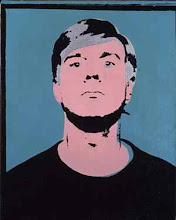 |
| [Unidentified work on roof of Stockwell Depot] |
This exhibition and associated publication by Sam Cornish celebrate a fascinating moment in British art: the Stockwell Depot studios flourished in a period of notable social, political and aesthetic turbulence. As John A. Walker records in Left Shift: Radical Art in 1970s Britain: "During the 1960s, the formalist ideas of the American critic Clement Greenberg... had dominated art theory in Britain and there were some British artists - mostly abstract painters and sculptors associated with St. Martin's School of Art...and the Stockwell Depot studios in South London - who continued to be influenced by the Greenbergians during the 1970s." (p5) The emergence of Conceptual Art and the subsequent fashionable fascination with French theory that gave rise to Postmodernism effectively marginalised formalist abstraction - yet many artists such as those associated with the Stockwell Depot stubbornly persisted in their aesthetic convictions. Hopefully, Sam Cornish's book will throw some much needed light on a neglected patch of British art history - it was surprisingly difficult to track down relevant information just to write this blog entry. I look forward to learning more.
 |
| Peter Hide, Beryl |
 |
| Fred Pollock, Honeydripper, 1977 |
 |
| David Evison |
 |
| John Foster, Full Face, 1978 (left) and Katherine Gili, Vertical IV, 1975 |
 |
| Roland Brenner, Deep Space, |
 |
| Roland Brener, Sculpture with Single Arch, 1968 |
 |
| [Unidentified artists/work on the roof of Stockwell Depot] |
 |
| Stockwell Depot: Sculpture Exhibition (1968) with Peter Hide, Sculpture No.2 |
 |
| View of Stockwell Depot |
 |
| Stockwell Bus Garage; architects: Adie, Button and Partners, 1952 |



No comments:
Post a Comment